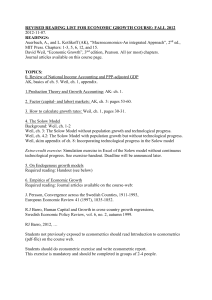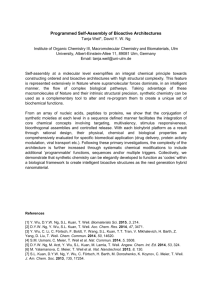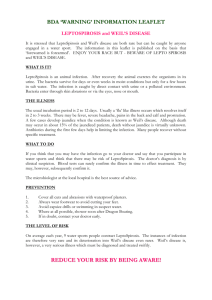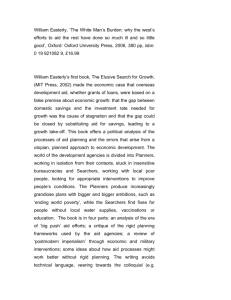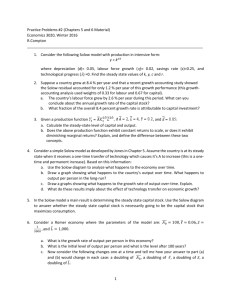Course Outline - Faculty Websites
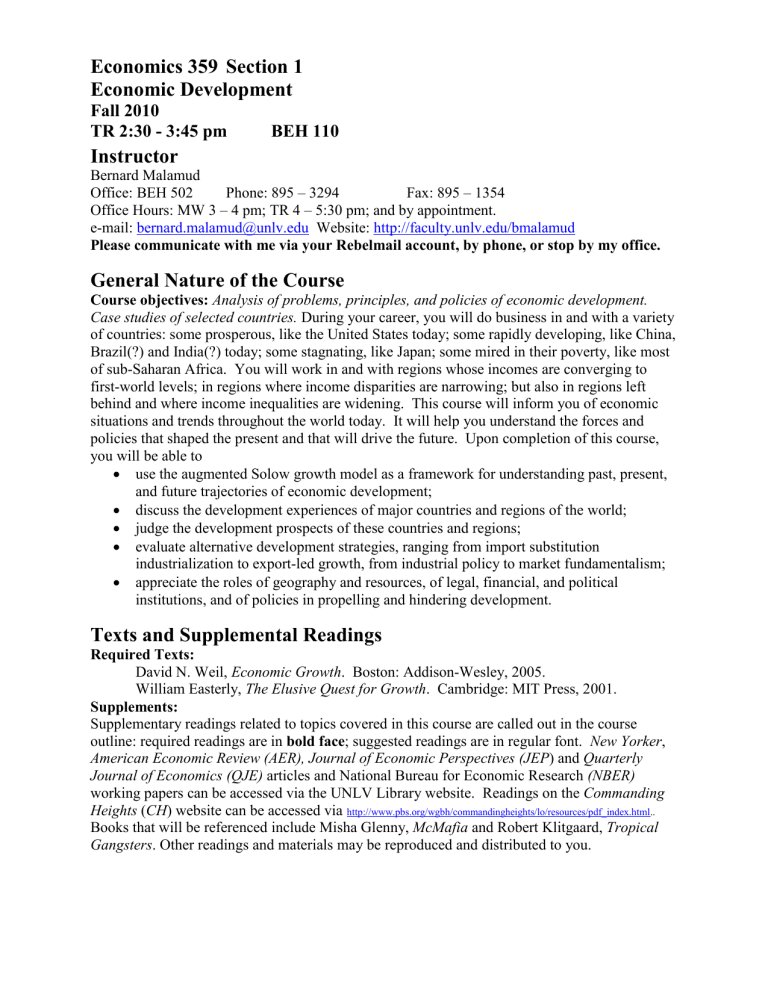
Economics 359 Section 1
Economic Development
Fall 2010
TR 2:30 - 3:45 pm BEH 110
Instructor
Bernard Malamud
Office: BEH 502 Phone: 895 – 3294 Fax: 895 – 1354
Office Hours: MW 3 – 4 pm; TR 4 – 5:30 pm; and by appointment. e-mail: bernard.malamud@unlv.edu
Website: http://faculty.unlv.edu/bmalamud
Please communicate with me via your Rebelmail account, by phone, or stop by my office.
General Nature of the Course
Course objectives: Analysis of problems, principles, and policies of economic development.
Case studies of selected countries. During your career, you will do business in and with a variety of countries: some prosperous, like the United States today; some rapidly developing, like China,
Brazil(?) and India(?) today; some stagnating, like Japan; some mired in their poverty, like most of sub-Saharan Africa. You will work in and with regions whose incomes are converging to first-world levels; in regions where income disparities are narrowing; but also in regions left behind and where income inequalities are widening. This course will inform you of economic situations and trends throughout the world today. It will help you understand the forces and policies that shaped the present and that will drive the future. Upon completion of this course, you will be able to
use the augmented Solow growth model as a framework for understanding past, present, and future trajectories of economic development;
discuss the development experiences of major countries and regions of the world;
judge the development prospects of these countries and regions;
evaluate alternative development strategies, ranging from import substitution industrialization to export-led growth, from industrial policy to market fundamentalism;
appreciate the roles of geography and resources, of legal, financial, and political institutions, and of policies in propelling and hindering development.
Texts and Supplemental Readings
Required Texts:
David N. Weil, Economic Growth . Boston: Addison-Wesley, 2005.
William Easterly, The Elusive Quest for Growth . Cambridge: MIT Press, 2001.
Supplements:
Supplementary readings related to topics covered in this course are called out in the course outline: required readings are in bold face ; suggested readings are in regular font. New Yorker ,
American Economic Review (AER), Journal of Economic Perspectives (JEP ) and Quarterly
Journal of Economics (QJE) articles and National Bureau for Economic Research (NBER) working papers can be accessed via the UNLV Library website. Readings on the Commanding
Heights ( CH ) website can be accessed via http://www.pbs.org/wgbh/commandingheights/lo/resources/pdf_index.html
..
Books that will be referenced include Misha Glenny, McMafia and Robert Klitgaard, Tropical
Gangsters . Other readings and materials may be reproduced and distributed to you.
Examinations and Grading
There will be two classroom exams and a comprehensive final exam given this semester. You will be able to re-do one question on each classroom exam at home; your score for that question will be the average of your classroom and take home scores. In addition, take-home essays based on problems in the Weil text will be assigned and graded. You will also be responsible to report on one news item related to economic development on an assigned day. Your final grade will be based on the following
Take-home essays
Classroom Exam, September 30
100 points
100 points
Classroom Exam, November 2 100 points
Comprehensive Final Exam, December 9, 3:10-5:10 150 points
Maximum overall score 450 points
Approximate Final Grade Distribution
Percentage Score FINAL GRADE
90 percent
80 percent
70 percent
60 percent
Borderline A-
Borderline B-
Borderline C-
Borderline D-
Attendance and class participation will affect your final grade.
Makeup Policy
Makeup exams may be arranged at mutual convenience if you have a compelling reason to miss a scheduled classroom exam. A makeup exam must be taken before the missed exam is returned to the class. There will be no makeup quizzes or final exam. However, a student missing a class because of observance of a religious holiday and students who represent UNLV at any official extracurricular activity shall also have the opportunity to make up assignments. Such students must provide official written notification no less than one week prior to the missed class(es).
Class Conduct
Your instructor and classmates deserve courtesy. If you must arrive late or leave early, do so quietly. Inform me beforehand if you must leave a class early. Smoking and eating in class are prohibited. Talking to your neighbors in class, texting, and reading newspapers and magazines is rude, disruptive, and unacceptable. While this probably need not be said, anyone found engaging in any act of academic dishonesty will be punished in accordance with UNLV policies.
Other Information
The Disability Resource Center (DRC) coordinates all academic accommodations for students with documented disabilities. The DRC is the official office to review and house disability documentation for students, and to provide them with an official Academic Accommodation
Plan to present to the faculty if an accommodation is warranted. Faculty should not provide students accommodations without being in receipt of this plan.
UNLV complies with the provisions set forth in Section 504 of the Rehabilitation Act of 1973 and the Americans with Disabilities Act of 1990, offering reasonable accommodations to qualified students with documented disabilities. If you have a documented disability that may require accommodations, you will need to contact the DRC for the coordination of services. The
DRC is located in the Student Services Complex (SSC), Room 137, and the contact numbers are:
VOICE (702) 895-0866, TTY (702) 895-0652, FAX (702) 895-0651. For additional information, please visit: <http://studentlife.unlv.edu/disability/>.
Date
Sep 9,14
Sep 16
Sep 21
Sep 23
Sep 28
Sep 30
Oct 5
Sep 7
Aug 24,26
Aug 31
Sep 2
Course Outline
Topics
Course organization
World Income, Health, and Growth http://hdr.undp.org/en/media/HDR_2009_Tables_rev.xls
(see tab H)
Purchasing Power Parity Real GDP
Observing Growth
Explaining Growth
Theories of Development : Smith/Ricardo/Marx/Lenin/Polanyi/
Schumpeter/Prebisch/Myrdal
World Bank, Development Economics Through the Decades http://books.google.com/books?id=baj6m0n0Fs8C&printsec=frontcover&dq=development+economics+through+the+decades&sourc e=bl&ots=Oh5yK1Sk7Z&sig=MZm8OXKPg6B2B9TmLcNY0SUz9vA&hl=en&ei=S0VoTP28EMaAlAfyg5miBQ&sa=X&oi=book
_result&ct=result&resnum=3&ved=0CCAQ6AEwAg#v=onepage&q&f=false
On CH : http://www.pbs.org/wgbh/commandingheights/lo/resources/pdf_index.html
Adam Smith and the Origins of Capitalism
Marx’s Analysis of Capitalism
Lenin’s Critique of Global Capitalism
Raul Prebisch and Dependencia Theory
Development Economics After World War II
Market Fundamentalism and Its Discontents
John Williamson, What Washington Means by Policy Reform http://www.iie.com/publications/papers/paper.cfm?ResearchID=486
D. North, J. Wallis, B. Weingast, A Conceptual Framework for
Interpreting Recorded Human History http://www.nber.org/papers/w12795
Lee Kuan Yew, Commanding Heights Interview
Hernando de Soto, Commanding Heights Interview
Joseph Stiglitz, Commanding Heights Interview
J. Surowiecki, Morale’s Mistake,
The New Yorker , 1/23/06, G
The Solow Framework
Convergence
Population and Economic Growth
Population Trends/Urbanization
G. Packer, The Megacity, The New Yorker, Nov. 13, 2006
J. Harris and M. Todaro, Migration, Unemployment and
Development: A Two Sector Model, AER, March 1970 http://faculty.washington.edu/danby/todaro/Todaro.htm
Augmenting Solow: Health and Education
Catch-up and review
Classroom Exam, 100 points
Cross-Country Productivity Differences: Technology Reigns
Growth Accounting
P. Krugman, The Myth of Asia’s Miracle http://www9.georgetown.edu/faculty/mh5/class/econ102/readings/myth_of_asias-miracle.pdf
Readings in
Texts
Easterly, Ch. 1
Weil, Ch. 1
Ch. 1Appendix
Weil, Ch. 2
Easterly, Ch. 2
Weil, Ch. 3
Ch. 3Appendix
Weil, Ch. 4
Easterly, Ch. 5
Weil, Ch. 5
Weil, Ch. 6
Easterly, Ch. 4
Weil, Ch. 7
Easterly, Ch.3
Date
Oct 7
Oct 12
Oct 14
Oct 19
Oct 21,26
Oct 28
Nov 2
Nov 4
Nov 9,16
Nov 11
Nov 18
Nov 23
Nov 25
Nov 30
Dec 2
Dec 9
Course Outline, continued
Topics
Augmenting Solow: Openness
Catch-up and convergence
R. Lucas, Trade and Diffusion of the Industrial Revolution http://www.princeton.edu/~ies/Spring07/LucasPaper.pdf
Augmenting Solow: Government/Corruption
M. Glenny, McMafia
R. Klitgaard, Tropical Gangsters
Augmenting Solow: Inequality
Augmenting Solow: Culture and Conflict
W. Easterly & R. Levine, Africa’s Growth Tragedy,
QJE , 11/97
G. Packer, Gangsta War, The New Yorker , 11/3/03
B. Bilger, The Path of Stones, The New Yorker , 10/2/06
Augmenting Solow: Tropics and Resources
K. Sokoloff & S. Engerman, Factor Endowments, Inequality, and
Paths of Development Among New World Economics, http://www.nber.org/papers/w9259 ; also JEP , Summer 2000.
Augmenting Solow: Finance/Credit/Aid
N. Kristof, Aid: Can It Work?, NY Review of Books , 10/5/06
M. Yunus, Banker to the Poor . NY: Public Affairs, 1999.
Classroom Examination, material since last exam, 100 points
Augmenting Solow: Institutions
D. Acemoglu, et.al., Colonial Origins of Comparative Dev www.nber.org/papers/w7771 ; also AER , Dec 2001
D. Acemoglu, et.al., Reversal of Fortune www.nber.org/papers/w8460 ; also QJE Nov 2002
W.Easterly&R.Levine, Tropics, Germs, Crops, http://www.nber.org/papers/w9106
Veterans Day Recess
Limits to Growth
M. Specter, The Last Drop, The New Yorker , 10/23/06
Technology and Growth
Thanksgiving Recess
The Way Forward: Consensus and Dissent
Revisit September 2 and 7 readings
Catch-up and review
Comprehensive Final Exam, 3:10 – 5:10 pm, 150 points
Readings in
Texts
Weil, Ch. 11
Weil, Ch. 12
Easterly,
Ch.11,12
Weil, Ch. 13
Weil, Ch. 14
Easterly, Ch.13
Weil, Ch. 15
Easterly,
Ch.2,6,7
Weil, Ch. 16
Weil, Ch. 8,9
Easterly,
Ch.8,9
Weil, Ch. 17
Easterly, Ch.14
